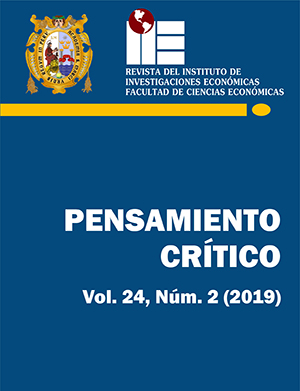Certificación laboral y empleabilidad de los beneficiarios del programa Impulsa Perú, 2011-2016
DOI:
https://doi.org/10.15381/pc.v24i2.17448Palabras clave:
Certificación de competencias laborales, salario, experiencia laboral, empleabilidad, análisis de varianza, regresión linealResumen
El estudio se centró en los resultados obtenidos a través del servicio de Certificación de Competencias Laborales brindado por el Programa Impulsa Perú del Ministerio de Trabajo y Promoción del Empleo (MTPE) durante los años 2011 – 2016, de acuerdo a la normativa establecida por la Dirección General de Formación Profesional y Capacitación Laboral (DGFPCL), así como a los lineamientos del Programa Presupuestal 0116 “Mejoramiento de la Empleabilidad e Inserción Laboral – PROEMPLEO”. Estos resultados se midieron en base a dos indicadores clave como son el nivel de experiencia laboral y el nivel de salario, los cuales están ligados a la empleabilidad de una persona. Para ello, se tomaron cuatro muestras cuyo tamaño por muestra fue de 1,804 beneficiarios con competencias laborales certificadas y se compararon con los 1,804 beneficiarios no competentes. Se pudo concluir que la permanencia en el mercado laboral tuvo significancia en el análisis de varianza y en dos de las cuatro muestras, mostrando diferencias de 1 a 3 meses. Por otro lado, el salario mostró significancia tanto en el análisis de varianza como para las cuatro muestras comparadas, con diferencias entre S/ 30 a S/ 70 soles.
JEL: J01, E24, C2
Descargas
Publicado
Número
Sección
Licencia
Derechos de autor 2020 Christian Omar Silva Suárez

Esta obra está bajo una licencia internacional Creative Commons Atribución-NoComercial-CompartirIgual 4.0.
LOS AUTORES RETIENEN SUS DERECHOS:
a. Los autores retienen sus derechos de marca y patente, y tambien sobre cualquier proceso o procedimiento descrito en el artículo.
b. Los autores retienen el derecho de compartir, copiar, distribuir, ejecutar y comunicar públicamente el articulo publicado en la revista Pensamiento Crítico (por ejemplo, colocarlo en un repositorio institucional o publicarlo en un libro), con un reconocimiento de su publicación inicial en la revista Pensamiento Crítico.
c. Los autores retienen el derecho a hacer una posterior publicación de su trabajo, de utilizar el artículo o cualquier parte de aquel (por ejemplo: una compilación de sus trabajos, notas para conferencias, tesis, o para un libro), siempre que indiquen la fuente de publicación (autores del trabajo, revista, volumen, numero y fecha).






